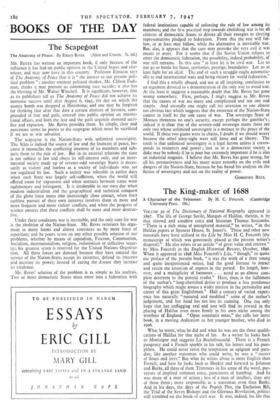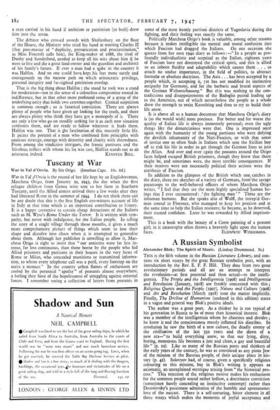The King-maker of 1688
A Character of the Trimmer. By H. C. Foxcroft. (Cambridge University Press. 18s.)
VOLUME 50 of The Dictionary of National Biography appeared in 1897. The life of George Savile, Marquis of Halifax, therein, is by that shrewd and sensitive critic and historian Thomas Seccombe. "There is a rich mine of unexplored material," he writes, "in the Halifax papers at Spencer House, St. James's. These and other new materials have been utilised in the Life by Miss H. C. Foxcroft (the manuscript of which was generously placed at the present writer's disposal)." He also refers to an article "of great value and interest" by Miss Foxcroft in the English Historical Review, October, 1896. When it appeared in 1898 Miss Foxcroft's Life, "though," to quote the preface of the present book, "it was the work of a then young and quite inexperienced writer, had the good fortune to attract and retain the attention of experts in the period. Its length, how- ever, and a multiplicity of footnotes . . . acted as an almost com- plete deterrent to the general reader." Here, then, is the fulfilment of the author's "long-cherished desire to produce a less ponderous biography which might arouse a wider interest in the personality and career of this great Englishman." Half a century of varied experi- ence has naturally "matured and modified" some of the author's judgement, and her hand has not lost its cunning. One can only hope that her unflagging zeal and zest will find its reward in the placing of Halifax even more firmly in his own niche among the worthies of England. "Opus senectutis meae," she calls her latest book, in a moving dedication to her younger brother, who died in 1906.
What he wrote, what he did and what he was are the three qualifi- cations of Halifax for that niche of his. As a writer he looks -back to Montaigne and suggests La Rochefoucauld. There is a French pungency and a French sparkle in his talk, his letters and his pam- phlets. He could never resist the temptation to epigram and para- dox; like another statesman who could write, he was a "master of flouts and jeers." But what he writes about is more English than French, and here he looks back to Hooker and forward to Johnson and Burke, all three of them Trimmers in his sense of the word, pur- veyors of inspired common sense, puncturers of humbug. And he was more of a man of action ; less of a man of intellect, than any of these three ; more responsible as a statesman even than Burke. And in his days, the days of the Popish Plot, the Exclusion Bill, the Trial of the Seven Bishops and the Glorious Revolution, politics still trembled on the brink of civil war. It was, indeed, his life that a man carried in his hand if ambition or patriotism (or both) drew him into the arena.
The debater who crossed swords with Shaftesbury on the floor of the House, the Minister who tried his hand at steering Charles II (that past-master of "duplicity,, prevarication and procrastination," as Miss Foxcroft calls him), the King-maker of 1688, the rival of Danby and Sunderland, needed to keep all his wits abput him if he were to live and die a great land-owner and the guardian and architect of his family's future. If ever a man had a stake in the country it was Halifax. And no one could have, kept his feet more surely and courageously on the narrow path on which aristocratic privilege, personal integrity and far-sighted patriotism overlap.
That is the big thing about Halifax ; the stand he took was a stand for moderation—not in the sense of a colourless compromise rooted in indifference, but in that other more profound sense of a grasp of the underlying unity that holds two extremes together. Cynical scepticism is common enough ; so is fanatical Conviction. There are always plenty of people who have given up looking for the truth, and there are always plenty who think they have got a monopoly of it. There are only a few'who go on steadily seeking for it as each new situation confronts them, and are ready to follow wherever it leads them. Halifax was one. That is the fascination of this masterly little life. It paints the portrait of a man who combined firm principles with cautious strategy, courage with dexterity and charity with shrewdness. From among the vindictive intrigues, the frantic partisans and the frivolous triflers with whom his lot was cast, Halifax stands out as an



































 Previous page
Previous page